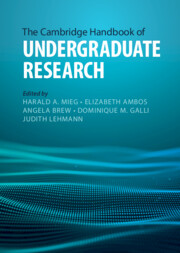Book contents
- The Cambridge Handbook of Undergraduate Research
- The Cambridge Handbook of Undergraduate Research
- Copyright page
- Contents
- Figures
- Tables
- Contributors
- Foreword
- Foreword
- 1 Introduction
- Part I Theory and Research on Undergraduate Research
- Part II Implementation, Approaches, Methods
- Part III Disciplines
- 17 Introduction
- Part III.1 STEM
- Part III.2 Health
- 24 Undergraduate Research in Medicine
- 25 Undergraduate Research in Health Sciences
- 26 Undergraduate Research in Nursing
- 27 Undergraduate Research in the Exercise Science Discipline
- Part III.3 Social Sciences
- Part III.4 Humanities
- Part III.5 Arts & Design
- Part III.6 Disciplines A–Z
- Part IV International Perspective
- Part V Avenues for Developing Undergraduate Research
- Index
- References
24 - Undergraduate Research in Medicine
from Part III.2 - Health
Published online by Cambridge University Press: 11 August 2022
- The Cambridge Handbook of Undergraduate Research
- The Cambridge Handbook of Undergraduate Research
- Copyright page
- Contents
- Figures
- Tables
- Contributors
- Foreword
- Foreword
- 1 Introduction
- Part I Theory and Research on Undergraduate Research
- Part II Implementation, Approaches, Methods
- Part III Disciplines
- 17 Introduction
- Part III.1 STEM
- Part III.2 Health
- 24 Undergraduate Research in Medicine
- 25 Undergraduate Research in Health Sciences
- 26 Undergraduate Research in Nursing
- 27 Undergraduate Research in the Exercise Science Discipline
- Part III.3 Social Sciences
- Part III.4 Humanities
- Part III.5 Arts & Design
- Part III.6 Disciplines A–Z
- Part IV International Perspective
- Part V Avenues for Developing Undergraduate Research
- Index
- References
Summary
The discipline of medicine advances through research. The medical education community worldwide recognizes that the evolving field of medicine and its progress requires that medical students participate in research. Undergraduate research during premedical and/or medical studies influences the practice of clinical medicine and facilitates the development of physician-scientists. The essential nature of the discipline, the structures and length of medical education worldwide, and the opportunities for research activity are important to understand. Implementation programs that use a competency-based medical education approach find that research is important for meeting medical board competencies. Curricular and research participation barriers exist, but models that integrate research and provide mentored experiences within the academic and training environment can decrease these barriers. Further growth of research preparation in medicine and enhancement of competencies is possible through assessment and continuous quality improvement.
Keywords
- Type
- Chapter
- Information
- The Cambridge Handbook of Undergraduate Research , pp. 241 - 249Publisher: Cambridge University PressPrint publication year: 2022

